NASHVILLE (BP)—The recent elimination of five Southern Baptist Convention Executive Committee staff positions—including two related to ministry among Hispanics and Asians—prompted letters from ethnic leaders.
Prior to Sept. 13, Luis Lopez directed Hispanic relations and mobilization, and Peter Yanes led Asian American relations and mobilization.
The California Southern Baptist Convention first reported the letters from the National Hispanic Baptist Network and a group of 18 Asian American church leaders.
‘Unhelpful’ and ‘short-sighted’ decision
The National Hispanic Baptist Network expressed “disappointment” at the elimination of Lopez’s position.
“We believe that the decision to eliminate this position is unhelpful, short-sighted, and leaves Hispanic Baptists with no representation on the Executive Committee as well as the Board of trustees (again),” the letter said. “This represents a step backwards in our communication and collaboration when we should be moving forward together to reach and disciple the lost in the U.S. and beyond (including the more than 52,000,000 lost Hispanics in the U.S.).”
The letter from National Hispanic Baptist Network Executive Director Bruno Molina included statements from Pete Ramirez, executive director of the California Southern Baptist Convention; Emanuel Roque, Hispanic Multicultural catalyst for the Florida Baptist Convention; and Jesse Rincones, executive director of Convención Bautista Hispana de Texas.
The network delivered the letter—which included a request for an in-person meeting—to Executive Committee Interim President and CEO Jonathan Howe.
“This is devastating news for the over 3,000 Hispanic Baptist congregations in the SBC,” Rincones said. “I fear that the loss of Luis Lopez as the Associate Vice President for Hispanic Relations does not convey being ‘fully committed’ to relating with a fellowship that, if it were a state convention, would rank 4th largest.”
Ramirez said the Executive Committee’s decision to remove Lopez and Yanez from their positions “has left our partnering ethnic family with a deep sense of discouragement.”
“Their work is invaluable and made a positive impact in building unity throughout our SBC family, especially among groups of various languages and cultures,” Ramirez said.
“With a void in these important positions, where only diverse leadership can understand and minister to these specific differences, I’m not sure the EC will be able to fulfill this vital initiative.”
2011 work group study cited
Both groups cited a messenger-approved 2011 Executive Committee workgroup study analyzing ethnic involvement in Southern Baptist life.
That study originated from a 2009 motion by Paul Kim, pastor emeritus of Antioch Baptist Church in Cambridge, Mass., and ultimately led to a final report affirmed by the Executive Committee prior to the 2011 SBC annual meeting in Columbus, Ohio.
The letter signed by 18 Asian Baptist leaders said eliminating the positions opposed the mandate of the 2011 report.
“Ethnic fellowships value the SBC because of its emphasis to fulfill the Great Commission,” said Francis Chung, California Southern Baptist Convention Missions Initiative Team leader. “However, we hope that as we reach the nations and become more diverse, our leadership will reflect that diversity in our convention. It’s not that we need the leadership to look like us, rather, our leaders would understand the complexities and needs of the entire convention.
“The leadership of the SBC doesn’t look like us but what is even more concerning is that it does not understand nor represent the ethnic fellowships well.”
Howe points to budget constraints
The Executive Committee faced “several painful decisions” due to “current budget constraints,” Howe told the reporter from the California Southern Baptist Convention.
“Thankfully, these budget constraints affect only the EC and not the already-established networks of Korean, Chinese, Vietnamese, Hispanic, Brazilian, Laotian, Hmong, Native American, and other ethnic Southern Baptists who are taking the name and fame of Christ to their countrymen and beyond,” Howe said.
“Their vital work serves as a reminder that we are truly better together, and these ethnic fellowship groups represent the best of what we all strive for: a steadfast commitment to reaching all tongues and tribes with the Good News of Jesus Christ.”
Howe said it is impossible to ignore an ongoing budget crisis that has resulted in “painful” cuts to personnel and operations budgets.
“Over the past two years, we have spent nearly $10 million more than was budgeted and are on the verge of depleting our financial reserves as we continue to respond to the sexual abuse crisis across the Convention,” he said.
“Even with the recent personnel and operational cuts, the EC still does not have a balanced budget and will have to draw from reserves again in 2024.
“Unfortunately, it is unknown how long the EC will be facing these budgetary restrictions, but this is the reality in the present as well as for the foreseeable future.”
The Executive Committee has faced a significant financial downfall since 2021, due to the ongoing legal fees and investigation costs related to addressing sexual abuse.
Bearing costs for salaries previously shared
In November 2019, then-Executive Committee President and CEO Ronnie Floyd announced the addition of three full-time staff positions focused on increasing engagement among ethnic groups.
Julio Arriola quickly filled the first of those positions as Lopez’s predecessor over Hispanic relations and mobilizations. Yanes joined the following month. Charles Grant was named to oversee African American relations and mobilization in August 2020. All three positions were jointly funded by the Executive Committee and the North American Mission Board.
In December 2019, Willie McLaurin came on board in the newly created position of Executive Committee vice president for Great Commission Relations and Mobilization.
McLaurin’s role, which began the following January, called on him to “implement Cooperative Program and stewardship education, work to strengthen relationships and promote increased giving among Southern Baptist churches, develop strategies to strengthen relationships with multiple demographic groups within the SBC and provide oversight and assistance to the executive directors of church relations and mobilization for Hispanics, Asian Americans, African Americans and of church affiliations.”
In November 2021, NAMB shifted away from the partnership. Arriola became director of Send Network Southern Baptist Convention of Texas, a NAMB-funded role. Ashley Clayton, the executive director of church affiliation, whose position also was jointly funded by NAMB, moved to a church mobilization role with NAMB’s Send Network.
This meant NAMB and the Executive Committee went from equally sharing the cost of four positions to now each retaining responsibility for two, a budget-neutral impact.
In March 2022, McLaurin, who by then was interim Executive Committee President, hired Lopez to fill the vacant position for Hispanic mobilization, now fully funded by the Executive Committee.
Going forward, Grant will serve under the title of associate vice president for Convention Advancement and Relations.
“Significant gains in collective synergy, new fellowships and growth have been achieved among the Asian and Hispanic networks,” Grant told Baptist Press. “I am grateful to hear from both the Asian Collective leaders and the National Hispanic Baptist Network leaders concerning their heartfelt expressions about the recent EC staffing changes.
“Although the restructuring has caused pain, I am thankful for their willingness to dialogue about how to continue the momentum created by the partnership with the Executive Committee. I look forward to listening, learning and discovering ways to leverage opportunities to partner for strengthening diversity in the SBC and advancing the kingdom of God.”
In a statement to Baptist Press, Howe said that “diversity of representation and leadership is an integral part for the future of the Southern Baptist Convention—especially in our trustee system.”
Trustees are not selected by entities, Howe noted, but are received through a nominations process that requires approval of Southern Baptists at annual meetings.
Future discussions and efforts led by Grant with ethnic leaders will focus on how best to serve those communities.
Howe expressed his gratefulness to the International Mission Board and NAMB, as well as seminaries and state conventions with staff members “focused on mobilizing all ethnicities.”
“We are committed to partnering with them to continue to reach, elevate and mobilize Southern Baptists of all ethnicities and backgrounds,” he said.
With additional reporting by Managing Editor Ken Camp.
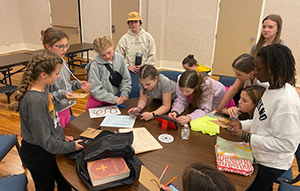
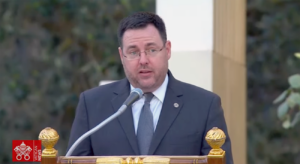




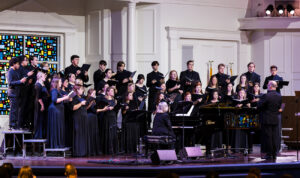

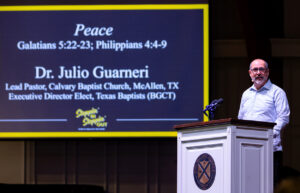
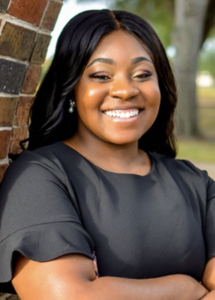 Shantavia Briana Reddick—affectionately known as Bree—died Sept. 9 in Spring. She was 26. Shantavia was born Sept. 6, 1997, in Lakeland, Fla. She was raised with unwavering love and care by her mother, Gracia Lettsome Reddick, and parents, Darrin and Arlean Moore, who nurtured her into being the remarkable individual God created. Arlean is on the Baptist Standard board of directors, and Darrin is the pastor of Truevine Missionary Baptist Church in Spring and a member of the Baptist General Convention of Texas Executive Board. While living in Arkansas for a year, Shantavia’s “village” grew to include her Mt. Carmel Baptist Church family. Shantavia attended Marguerite Van Elementary School in Conway and credited her fourth-grade teacher, Mark Cuddy, with playing a major role in her becoming a teacher. The Moores and Shantavia moved to Spring in 2008, joining Truevine Missionary Baptist Church. Shantavia made her personal proclamation of faith in Jesus Christ and was baptized at Truevine Missionary Baptist Church in 2008, where she remained a faithful member until her death. Shantavia served as a youth usher, youth choir member, summer camp worker, praise dancer and praise dance instructor. She in the Old Town Spring Heights Community and always was willing to do anything asked of her. From a young age, she displayed a natural talent for teaching, serving as a children’s church helper, teacher and director. She loved her church family and especially was excited when her mother moved to Texas, uniting all her parents in one place. Shantavia was homeschooled from sixth grade to 10th grade, affording her the opportunity to have the world as her classroom. Being homeschooled allowed her to travel, attend speaking engagements and gain business insight from her parents and godparents Dr. Christopher and Dr. Astra Sparks. She returned to public school her junior year, where she attended and graduated in 2016 from Klein Collins High School near Spring. While there, she solidified her plan to become an educator. Shantavia excelled in post-secondary education, earning a bachelor’s degree in education in 2020 from Prairie View A&M University, often reminding people, “PV produces productive people.” She also received a master’s degree in curriculum and instruction in 2023 from Texas Southern University. Shantavia was living her true calling as an educator. She began her career at her fifth-grade alma mater, Beneke Elementary School in Spring, as a para-professional while she completed her student teaching. At Smith Elementary School in Spring, she was awarded the “Rookie Teacher of the Year” honor upon completing an impressive first year of teaching. Her partner teacher and team lead, Dr. Kristal Buckles, quickly became a valued friend and mentor. Shantavia’s students were not just pupils; they also were cherished children she shaped with care and dedication. She believed in the power of education to transform lives and used her unique blend of intelligence and kindness to inspire countless young minds. Her classroom was a place of warmth, encouragement, grace and fun. She not only taught academic subjects, but she also instilled values of empathy, compassion and resilience. Her students remember her, not just as a teacher, but as a mentor, a friend and a source of unwavering support. Her passion for her Spring Independent School District students was rivaled only by her eagerness to impart life-changing knowledge to her students in Truevine Missionary Baptist Church’s children’s church. Shantavia also inspired outside of the classroom. She had a natural charm and charisma that drew people to her. Her smile exuded pure light and joy, matched only by her humility and genuine kindness. Her heart overflowed with generosity, always willing to lend a helping hand or a listening ear to those in need. Shantavia’s interests were diverse, reflecting her curiosity about the world. She enjoyed reading, studying the Bible, having biblical and life discussions with her dad, planning children’s lessons with her sister and co-director Kaitlan, and talking about education in Africa with her Auntie. Her intelligence and drive were matched only by her wit and bubbly personality. She had a unique ability to make those around her laugh—even in the darkest of times. After being in school nonstop from high school through completing her master’s degree, Shantavia was ready for a break and to do some traveling before taking the steps to enter a doctoral program. She is preceded in death by her maternal grandparents, Ismay Olympia and Rosald Lettsome Sr.; paternal grandfather, Walter Henry Reddick Sr.; aunts, Teresa Ann Reddick and Sharon “Liz” Moore-Smith; and cousin, Takeira Adderly. Left to cherish her memory are her mother, Gracia Lettsome Reddick; father and auntie-mom, Rev. Dr. Darrin and Arlean Moore; siblings, Freddie Lee Pullum II and Kaitlin Kirkwood; grandmothers, Dorothy Reddick and Lillie B. Moore; nephew, Noah Pullum; and a host of God-given siblings, cousins, uncles, aunts, great-aunts, godparents, church family, mentors, colleagues, old friends from Truevine Missionary Baptist Church and Prairie View A&M University, new friends from Texas Southern University, friends in East Africa, Truevine’s children’s church students, and Smith Elementary staff and students—all of whom forever will carry her legacy forward. In lieu of flowers, the family kindly requests donations be made to
Shantavia Briana Reddick—affectionately known as Bree—died Sept. 9 in Spring. She was 26. Shantavia was born Sept. 6, 1997, in Lakeland, Fla. She was raised with unwavering love and care by her mother, Gracia Lettsome Reddick, and parents, Darrin and Arlean Moore, who nurtured her into being the remarkable individual God created. Arlean is on the Baptist Standard board of directors, and Darrin is the pastor of Truevine Missionary Baptist Church in Spring and a member of the Baptist General Convention of Texas Executive Board. While living in Arkansas for a year, Shantavia’s “village” grew to include her Mt. Carmel Baptist Church family. Shantavia attended Marguerite Van Elementary School in Conway and credited her fourth-grade teacher, Mark Cuddy, with playing a major role in her becoming a teacher. The Moores and Shantavia moved to Spring in 2008, joining Truevine Missionary Baptist Church. Shantavia made her personal proclamation of faith in Jesus Christ and was baptized at Truevine Missionary Baptist Church in 2008, where she remained a faithful member until her death. Shantavia served as a youth usher, youth choir member, summer camp worker, praise dancer and praise dance instructor. She in the Old Town Spring Heights Community and always was willing to do anything asked of her. From a young age, she displayed a natural talent for teaching, serving as a children’s church helper, teacher and director. She loved her church family and especially was excited when her mother moved to Texas, uniting all her parents in one place. Shantavia was homeschooled from sixth grade to 10th grade, affording her the opportunity to have the world as her classroom. Being homeschooled allowed her to travel, attend speaking engagements and gain business insight from her parents and godparents Dr. Christopher and Dr. Astra Sparks. She returned to public school her junior year, where she attended and graduated in 2016 from Klein Collins High School near Spring. While there, she solidified her plan to become an educator. Shantavia excelled in post-secondary education, earning a bachelor’s degree in education in 2020 from Prairie View A&M University, often reminding people, “PV produces productive people.” She also received a master’s degree in curriculum and instruction in 2023 from Texas Southern University. Shantavia was living her true calling as an educator. She began her career at her fifth-grade alma mater, Beneke Elementary School in Spring, as a para-professional while she completed her student teaching. At Smith Elementary School in Spring, she was awarded the “Rookie Teacher of the Year” honor upon completing an impressive first year of teaching. Her partner teacher and team lead, Dr. Kristal Buckles, quickly became a valued friend and mentor. Shantavia’s students were not just pupils; they also were cherished children she shaped with care and dedication. She believed in the power of education to transform lives and used her unique blend of intelligence and kindness to inspire countless young minds. Her classroom was a place of warmth, encouragement, grace and fun. She not only taught academic subjects, but she also instilled values of empathy, compassion and resilience. Her students remember her, not just as a teacher, but as a mentor, a friend and a source of unwavering support. Her passion for her Spring Independent School District students was rivaled only by her eagerness to impart life-changing knowledge to her students in Truevine Missionary Baptist Church’s children’s church. Shantavia also inspired outside of the classroom. She had a natural charm and charisma that drew people to her. Her smile exuded pure light and joy, matched only by her humility and genuine kindness. Her heart overflowed with generosity, always willing to lend a helping hand or a listening ear to those in need. Shantavia’s interests were diverse, reflecting her curiosity about the world. She enjoyed reading, studying the Bible, having biblical and life discussions with her dad, planning children’s lessons with her sister and co-director Kaitlan, and talking about education in Africa with her Auntie. Her intelligence and drive were matched only by her wit and bubbly personality. She had a unique ability to make those around her laugh—even in the darkest of times. After being in school nonstop from high school through completing her master’s degree, Shantavia was ready for a break and to do some traveling before taking the steps to enter a doctoral program. She is preceded in death by her maternal grandparents, Ismay Olympia and Rosald Lettsome Sr.; paternal grandfather, Walter Henry Reddick Sr.; aunts, Teresa Ann Reddick and Sharon “Liz” Moore-Smith; and cousin, Takeira Adderly. Left to cherish her memory are her mother, Gracia Lettsome Reddick; father and auntie-mom, Rev. Dr. Darrin and Arlean Moore; siblings, Freddie Lee Pullum II and Kaitlin Kirkwood; grandmothers, Dorothy Reddick and Lillie B. Moore; nephew, Noah Pullum; and a host of God-given siblings, cousins, uncles, aunts, great-aunts, godparents, church family, mentors, colleagues, old friends from Truevine Missionary Baptist Church and Prairie View A&M University, new friends from Texas Southern University, friends in East Africa, Truevine’s children’s church students, and Smith Elementary staff and students—all of whom forever will carry her legacy forward. In lieu of flowers, the family kindly requests donations be made to